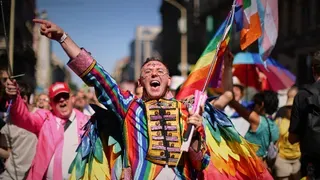August 10, 2009
Man's disappearance renews debate on 'Ex-Gay' netherworld
Joseph Erbentraut READ TIME: 7 MIN.
The mystery surrounding the location and well-being of Bryce Faulkner, a 23-year-old medical student who appears to have entered into an ex-gay treatment facility, has again thrust the controversial topic of reparative therapy into the public eye.
With any updates arriving heavily filtered through the gatekeepers of Faulkner's family, we are left only to speculate what can be found inside the ex-gay labyrinth.
The last person to have heard from Faulkner was Travis Swanson, a man who claims to be his boyfriend. That was on June 15, before Faulkner's family appears to have intervened in their son's relationship.
His mother Debra told FOX News Bryce is "fine" and that stories to the contrary are "not true." A statement by Bryce, released through a family representative, denied coercion on the part of his family.
Rev. Brett Harris, a pastor who has led a Web-based effort to get in touch with Faulkner, suspects otherwise. He has continued his effort despite receiving nearly 20 death threats from the site's visitors and a lawsuit threat from the Faulkner family.
"It would be simple for [Bryce] to get on a webcam and say 'I don't want to be gay anymore, I went to this camp on my own volition.' If he does that, God bless him and I'll take the site down," Harris told EDGE. "But there is no information coming from Bryce himself. This instantaneous conversion story that Debra is putting out there is baloney. She bullied and brow-beat him."
"[Bryce]'d lose everything including the family's love if he continued the relationship," Harris continued. "The loss of love is a very powerful thing, especially the loss of the love of your family. The fear of that happening is a great motivator to keep someone in a conversion therapy program."
Desperate and Vulnerable
Fear, often in combination with financial dependence, continues to play a major role in the decisions of some young gay men to enter into ex-gay programs, including those offered by national groups like Exodus International and Love in Action, according to gay and psychiatric observers opposed to their practices.
These companies sponsor hundreds of programs around the nation which vary greatly from one-on-one therapy sessions to intensive group live-in programs.
Wayne Besen, executive director of Truth Wins Out, an organization whose mission is to expose the "ex-gay industry," argues programs like Exodus deliberately market their programs to religious parents of recently out gay children. He was not surprised by the Faulkner case.
"These groups understand very well that they're marketing to desperate, vulnerable people who are looking for a lifeline. They tell [parents] what they want to hear, and when they hear those promises, they write the checks," Besen shared.
"The people who run these programs aren't qualified to give the psychological advice they're providing. They're causing great harm and avoid accountability at all costs. We don't know what their failure rate is, but we know from survivors that they're not doing so well in terms of success."
The harm incurred by "ex-gay survivors," as former attendees term themselves, comes in many forms, according to those interviewed for this story. Their stories reinforce reports from the overwhelming majority of Western mainstream psychological and psychiatric organizations that frown upon gay therapy programs.
Jacob Wilson, now 23 and living in Ames, Iowa, was 19 when he left his family and friends behind to enter a Love in Action camp in Memphis, Tenn., hundreds of miles from his then-home in Missouri. He was part of the camp during the same time 16-year-old Zachary Stark received national attention for being forced to attend a similar camp.
Though Wilson denies being forced into the program, he said coercion still had an impact on his decision. His pastor encouraged him to apply for the program once other members of his congregation found out he'd been dating an area preacher. His parents helped foot the bill for the program.
"When I told my parents I was gay, they didn't take it well, to say it lightly," Wilson said. "They were all for [the camp] if it could fix me so they encouraged me."
"I was at the lowest point in my life, the most depressed I'd ever been," he continued. "I realized, once I got into the program, that this was a common theme. They had all lost everything that'd meant something to them."
Inside the Ex-Gay Netherworld
Wilson spent two months in the Love in Action program. While there, Wilson and other attendees of the program faced strict regulations on their every move. They could not wear cologne or clothing by "gay brands" like Abercrombie & Fitch or Ralph Lauren.
They could not, at any time, be in the company of just one other person. Even trips to the bathroom needed to be made either alone or in a group of three. Journaling was not allowed.
"We referred to it as the 'LIA bubble,' being cut off from family and friends. I just fell off the face of the map," Wilson shared. "It was difficult and scary, because it was something that I'd never imagined in my life ... They trained us all to be little watchdogs for each other, reporting 'transgressions' for a reward."
The only face-to-face contact Wilson made with his family during the program was during a "friends and family" weekend, held a month and a half into his time in the camp. During one of the weekend's sessions, Wilson and the camp's other attendees stood before a room filled with the visiting families to verbally share their most shameful sins. The experience still haunts him to this day.
"I saw the fear in my parents' eyes as they watched their son talk about these things," he shared. "You have to air your dirty laundry for everyone to see. I still have these recordings in my head that these feelings are sinful and bad abominations. I have to tell myself, 'No, there is nothing wrong with me. I'm not sick.' I still have to have that inner dialogue."
'Not in God's Plan'
Other ex-gay survivors echo Wilson's experiences. Vincent Cervantes, now 22, was 18 when he sought treatment to overcome his homosexuality without the knowledge of his parents.
"I didn't believe [same-sex attractions] were in God's plan for me or for anyone," Cervantes said. "I needed help and didn't know where else to turn."
Cervantes underwent a year and a half of counseling sessions with his local pastor, culminating in an exorcism to rid himself of what was deemed a demonic possession. It was the last resort of a series of treatments that had proven unsuccessful. He described the counseling as "depressing and traumatic," incredibly trying to his Christian identity. At one point, he considered suicide.
"I was very lost when I came out of therapy," Cervantes shared. "Once I realized I wasn't going to 'overcome' homosexuality, i thought it meant I couldn't be a Christian anymore and I wondered if there was any possibility of reconciling the two."
"I barely knew what it meant to be gay and didn't have many positive images to go from. I thought I'd be promiscuous, get AIDS, die and go to hell," he continued. "I thought I would kill myself because I didn't want to live the rest of my life knowing that hell is where I'd end up when I died. It's not worth it."
Ex-gay therapy's crippling effects are not exclusive to religious settings. Daniel Gonzales, 29, was 18 when he began to seek outside help with hopes of becoming heterosexual. Raised in an American Baptist denomination, Gonzales was already familiar with the religious route to salvation, so reached out to the National Association for Research and Therapy of Homosexuality (NARTH) instead.
For a year and a half, he was counseled by the infamous Dr. Joseph Nicholosi in Southern California. Treatment consisted of what Gonzales described as "pseudo-science pop psychology," breaking down any attraction he felt to a man. It was a powerful message that lingered with him for years to follow.
"The idea was that the same-sex attractions were caused by a broken sense of masculinity and lack of self-confidence. You're attracted to other guys embodying the characteristics you're lacking," Gonzales described. "When you're so desperate to try and change, you're willing to believe it."
Beyond 'Ex-Gay'
Gonzales ultimately abandoned the teachings as he independently realized that his homosexuality was "neither something that needed to or could be changed." He, as well as Cervantes and Wilson, now participate in a group called Beyond Ex-Gay, a network of ex-gay survivors who share their testimonials with hopes it will dissuade others from seeking harmful therapy.
"These programs are everywhere and so few people know they exist," Wilson said." For us to come together and be one voice saying that these ex-gay programs do more harm that good, telling people that you're OK being gay and OK the way you are, I believe saves lives."
As they reflected on the case of the still-silenced Faulkner, all sources interviewed for this story anxiously anticipated his words eventually being heard. They hope for the best - that Faulkner may be avoiding the damaging effects they endured - but fear the worse.
"What bothered me most [from my treatment] was the idea that God didn't love me anymore," Cervantes, who now does public speaking engagements on his experiences, said. "If I could speak with Bryce, I would tell him what I wish someone would have told me: That he is loved."
Now, the American Psychological Association has finally decided that "ex-gay" therapies don't really work. The organization, which governs psychiatric workers, ruled in early August that mental health professionals should not counsel patients to try to change their sexual orientation.
Instead, counselors should help patients come to terms with their sexuality. If they are members of a religious denomination that condemns their behavior, the organization ruled, perhaps the counselor should advise them to seek a more welcoming congregation.
Joseph covers news, arts and entertainment and lives in Chicago. He is the assistant Chicago editor for The Huffington Post. Log on to www.joe-erbentraut.com to read more of his work.






